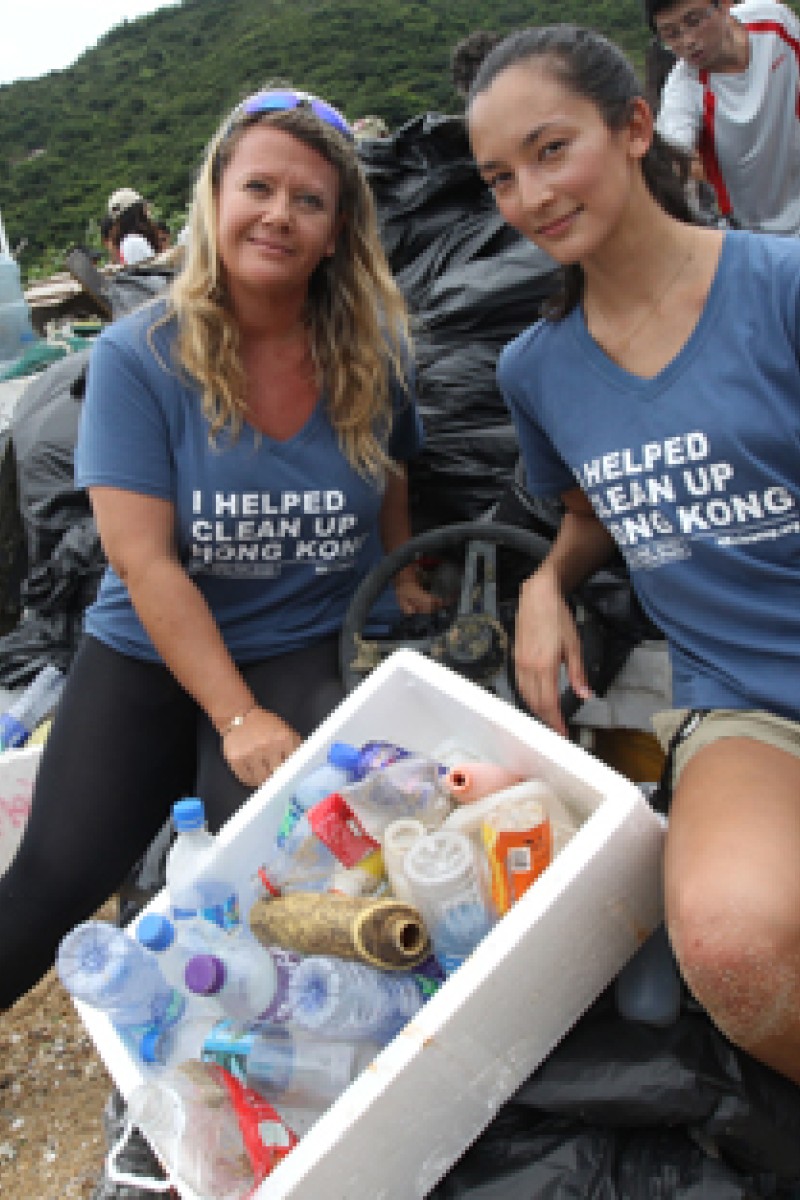 Lisa Christensen (left) and Nissa Marion take part in a clean-up event
Lisa Christensen (left) and Nissa Marion take part in a clean-up event"There was such a lot of rubbish in the Sai Kung beach area; I didn't realise until then just how bad the problem was," she says.
"I made a promise to myself, right then, that I'd never again use any plastic items that aren't re-usable.
"Now, when I go out, I always bring my own water bottle. I also bring my own cup to buy coffee. I'll say no when I'm offered a straw for my drinks. There're all simple, little things that you can change in your daily life, which will make a big difference to our world."
Her life-changing decisions came after she and her family took part in the annual, not-for profit environmental community activity, the Hong Kong Cleanup Challenge.
Her school friend Matthew Ho, also 17, shares her concerns about rubbish polluting the world.
He and Georgia plan to organise a school team to take part in this year's clean-up campaign.
As an athlete, Matthew found himself tackling the rubbish head-on - literally - while taking part in swimming training in the sea off Repulse Bay. "I was swimming among piles and piles of discarded plastic in the sea - bags, bottles, containers, and other stuff."
Matthew is so dedicated to the campaign that he spent this summer working as an intern with the non-governmental organisation that helps run Hong Kong Cleanup.
"I've learned how event management [such as the beach clean-up events] can help raise people's awareness," he says. "It has also reinforced my interest to pursue environmental-related studies at university, and also as a future career."
A clean-up event at Sok Kwu Wan beach on Lamma Island
Hong Kong's students and youth make up 50 per cent of all the volunteers taking part in Hong Kong Cleanup, says Lisa Christensen, who founded the event in 2000. "Our younger generations are committed to and passionate about promoting the cause; they're the ones leading the charge. Some are training their parents how to recycle at home."
Last year, 40,000 Hong Kong volunteers collected more than 105,500 kilograms of rubbish spread over 637 kilometres of coastline, hiking trails and urban areas. The big turnout made Hong Kong's the fourth largest out of 97 participating countries and locations.
Nissa Marion, co-founder of the event, says: "The clean-up isn't a solution; it's an educational experience. It's about how to live a sustainable life by reducing waste. Seeing a place full of trash, then leaving it clean, is a wonderful feeling that makes you feel good about what you've done."
The two Canadians have dedicated their lives to ensuring the 13-year campaign is a success. They help volunteers organise each event, including how to record data on forms, about the types of rubbish collected.
Events includes fun competitions, such as prizes for the strangest rubbish discovered. "Someone found a taxi door once," Marion says.
Analysis of the data is published in the Ocean Trash Index Report - a global record compiled by the Ocean Conservancy environmental group.
Christensen says the campaign's positive results over the years have changed people's attitudes. "When I first started the organisation, there weren't many local people joining us. Now 85 per cent of volunteers are local people," she says. "The mentality of 'pick up after me' is changing."
You can join the Hong Kong Cleanup Challenge, which runs until November 1. For free registration and details, go to www.hkcleanup.org
You might also like:
- Despite widespread fears, most recycled products can be safe for use
